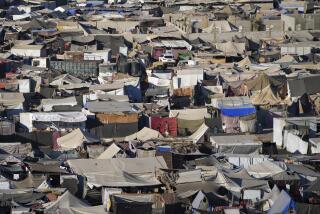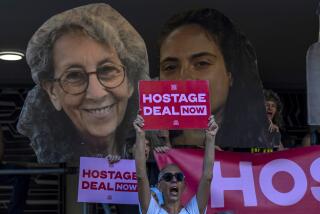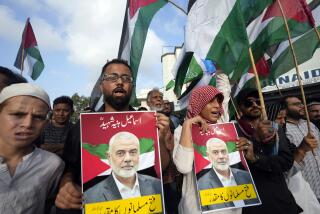Syria opposition delegates arrive in Geneva for peace talks
After days of delay and rampant uncertainty, representatives of the major Syrian opposition group arrived in Geneva on Saturday for peace talks convened by the United Nations and backed by major powers, including the United States.
“We came here to test the regime’s intentions,” said Monzer Makhous, a spokesman for the coalition known as the High Negotiations Committee, upon arriving in the Swiss city where the talks opened Friday without opposition representation.
Still, it remained unclear whether negotiations would actually take place under a broad international effort to end the almost 5-year-old Syrian conflict. So far, the process has been mired in ambiguity.
The Saudi-Arabia-based committee, an umbrella group of armed Syrian factions and political dissidents, had threatened to boycott the talks if the government of Syrian President Bashar Assad did not meet certain preconditions, including halting the bombardment and sieges of rebel-held areas.
On Friday, the committee confirmed that it would send a contingent to Geneva but said it would only meet with the U.N. and not negotiate with Syrian government officials.
Salem al-Meslet, the group’s chief spokesman, told reporters Saturday that opposition delegates were seeking “some sign of goodwill from the regime,” possibly relief for besieged areas, a cessation of bombardments and the release of women and child prisoners.
The U.S. government, which backs the talks and has been a major supporter of Syrian opposition groups, has urged the committee to participate in the negotiations without setting conditions.
Representatives of the Syrian government arrived in Geneva on Friday and met at U.N. headquarters with Staffan de Mistura, the U.N. special envoy for Syria and chief mediator for the talks.
The sessions here already had been defined as “proximity talks,” in which the different sides would remain in separate rooms while U.N. officials shuttled between them. U.S. Secretary of State John F. Kerry has said that having opposing groups staring or shouting at each other across a table would not be productive.
The Syrian talks originally were set to begin Monday but were pushed back to Friday amid uncertainty about who would represent the fragmented Syrian opposition, which ranges from hardcore Islamist fighters to peaceful secular dissidents inside and outside Syria.
Russia, a key ally of the Assad government, has objected to the participation of some members of the Saudi-based opposition coalition. Moscow has labeled as “terrorists” a pair of armed factions — Ahrar al Sham and Jaish al Islam — that are part of the coalition.
Still, it appears that the umbrella group has emerged as the principal opposition bloc here.
While facing international pressure to participate in the talks, the opposition coalition also must contend with considerable sentiment inside its ranks against making concessions to the Assad government and its allies, Russia and Iran.
Since September, Russian air power has helped turn the tide of battle in favor of the government, which has made significant advances in the run-up to the Geneva talks. Iran has provided military advisors and Shiite Muslim militia to aid the Syrian army, which is overstretched and fighting on many fronts.
The talks here, sometimes called “Geneva 3,” follow two earlier rounds of negotiations that collapsed in 2014 amid heated disagreement about the future of the Syrian president.
Then, as now, the opposition has insisted that Assad must leave office as part of any transition process in Syria. The government and its allies say it is up to the Syrian people to decide Assad’s fate in a fair election.
In the last two years, much has changed in the geopolitical backdrop to the Syrian conflict.
The Obama administration has shifted its priorities from pushing Assad out of office to defeating Islamic State, the Al Qaeda breakaway group that emerged from the chaos in Syria and has grabbed huge chunks of territory there and in neighboring Iraq. The U.S. is leading a multinational coalition that is carrying out airstrikes against Islamic State targets in both countries.
Meanwhile, the flow of refugees from Syria has fueled a migrant crisis in Europe, bringing calls from European leaders to find a political solution to the war.
The U.N. plan for the peace talks envisions an 18-month timetable for a political transition in Syria, including the drafting of a new constitution and U.N.-backed elections. However, many consider the timetable optimistic considering the deep fractures in Syrian society.
In Geneva, where the international media has arrived in force to cover the talks, journalists crowded into the lobby of the hotel where opposition delegates were reported to be staying.
Reporters eyed every approaching car closely, only to be disappointed when bewildered hotel guests emerged instead of opposition members, who reportedly were delayed at the airport because of visa issues.
Security guards assigned to opposition delegates seemed equally uninformed, flitting between the hotel bar and the lobby.
When asked whether they had any idea when the delegation would arrive, one bodyguard responded with a curt, “If I knew, I wouldn’t tell you.”
Bulos is a special correspondent.
Twitter: @mcdneville
ALSO
Syria peace talks get off to rocky start in Geneva
At least 35 drowned as migrant boat capsizes off Turkey
Iranian President Hassan Rouhani in Paris to court investors
More to Read
Sign up for Essential California
The most important California stories and recommendations in your inbox every morning.
You may occasionally receive promotional content from the Los Angeles Times.










